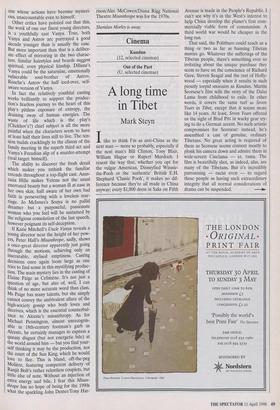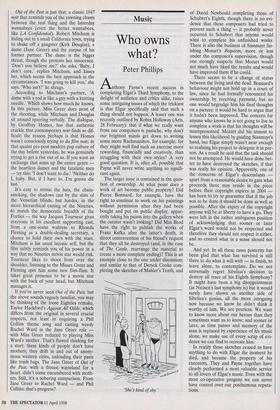Cinema
Kundun (12, selected cinemas) Out of the Past (U, selected cinemas)
A long time in Tibet
Mark Steyn
Ilike to think I'm as anti-China as the next man — more so probably, especially if the next man's Bill Clinton, Tony Blair, William Hague or Rupert Murdoch. I resent the way that, whether you opt for the vulgar American, Disneyfied Winnie- the-Pooh or the 'authentic' British E.H. Shephard `Classic Pooh', it makes no dif- ference because they're all made in China anyway; every $1,000 dress in Saks on Fifth Avenue is made in the People's Republic. I can't see why it's in the West's interest to help China develop the planet's first com- mercially viable form of communism. A third world war would be cheaper in the long run.
That said, the Politburo could teach us a thing or two as far as banning Tibetan movies go. Whatever the sufferings of the Tibetan people, there's something ever so irritating about the unique purchase they seem to have on the conscience of Richard Gere, Steven Seagal and the rest of Holly- wood — especially when it results in such piously torpid snoozers as Kundun. Martin Scorsese's film tells the story of the Dalai Lama from childhood to exile. In other words, it covers the same turf as Seven Years in Tibet, except that it seems more like 14 years. At least, Seven Years offered us the sight of Brad Pitt in wacky gear try- ing to do a German accent. No such artistic compromises for Scorsese: instead, he's assembled a cast of genuine, ordinary Tibetans. No great acting is required of them as Scorsese seems content mostly to plonk his camera down and admire them in wide-screen Cinelama — er, rama. The film is beautifully shot, as indeed, alas, are many of the Tibetans. But it's incredibly patronising — racist even — to regard these people as having such extraordinary integrity that all normal considerations of drama can be suspended. Out of the Past is just that: a classic 1947 noir that reminds you of the yawning chasm between the real thing and the latterday wannabees (even the better wannabees, like LA Confidential). Robert Mitchum is hiding out in a small California town, trying to shake off a gangster (Kirk Douglas), a dame (Jane Greer) and the corpse of his former partner. The dame is the bigger threat, though she protests her innocence. `Don't you believe me?' she asks. 'Baby, I don't care,' replies Mitchum, and kisses her, which seems the best approach in the circumstances. 'I was going to kill you,' she says. 'Who isn't?' he shrugs.
According to Mitchum's partner, 'A dame with a rod is like a guy with a knitting needle.' Which shows how much he knows. In this picture, Miss Greer does most of the shooting, while Mitchum and Douglas sit around sparring verbally. The dialogue, by Geoffrey Homes, has that authentic crackle that contemporary noir finds so dif- ficult: the reason perhaps is that Homes wasn't consciously trying to do film noir; in that quaint pre-post-modern pop culture of the day before yesterday, he was genuinely trying to get a rise out of us. If you want an exchange that sums up the entire genre the heartless dames and the fatalistic men — try this: 'I don't want to die.' Neither do I, baby. But, if I have to, I'm gonna die last.'
It's easy to mimic the hats, the chain- smoking, the shadows cast by the slats of the Venetian blinds, but harder, in the more hierarchical casting of the Nineties, -to match the democratic breadth of the Forties — the way Jacques Toumeur gives everyone in his excellent supporting cast, from a one-scene waitress to Rhonda Fleming as a double-dealing secretary, a chance to hold their own with the stars. Mitchum is his usual laconic self, but the film subtly reminds you of his power in a way that no Nineties movie star would risk. Tourneur likes to shoot from over the shoulder, listening to the Misses Greer and Fleming spin him some new flim-flam. It takes great presence to be a movie star with the back of your head, but Mitchum manages it.
If you've never seen Out of the Past, but the above sounds vaguely familiar, you may be thinking of the loose Eighties remake, Taylor Hackford's Against All Odds, which differs from the original in several crucial respects, not least in requiring a Phil Collins theme song and casting weedy Rachel Ward in the Jane Greer role with Miss Greer reduced to playing Miss Ward's mother. That's flawed thinking for a start: these kinds of people don't have mothers; they drift in and out of anony- mous western cities, unloading their pasts like trash bags. The Jane Greer of Out of the Past, with a frozen wasteland for a heart, didn't come encumbered with moth- ers. Still, it's a sobering comparison. From Jane Greer to Rachel Ward — and Phil Collins: that's progress?



































































 Previous page
Previous page